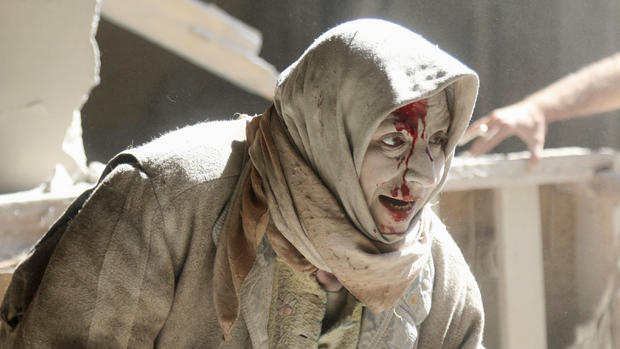Tenuous U.S.-Russia brokered cease-fire in Syria starts
BEIRUT - A U.S.-Russian brokered cease-fire for Syria came into effect on Monday at sunset, with monitoring groups and state media reporting clashes up until the final minutes, and the most powerful rebel groups voicing significant reservations about the truce agreement.
Syria’s military announced at 7 p.m. (1600 GMT) that it would abide by a cease-fire until Sunday at midnight, while maintaining its right to defend itself against any violations.
The cease-fire marks the latest attempt to end the five-year Syrian conflict, which has killed more than 250,000 people and driven some 11 million from their homes. The 2011 uprising against President Bashar Assad began with peaceful protests but escalated into a civil war following a brutal government crackdown and the rise of an armed insurgency.
Russia and Western nations hope the truce can lead to the revival of peace talks between Assad’s government and the rebels battling to overthrow him, and contribute to efforts to defeat the Islamic State of Iraq and Syria (ISIS) and other extremists in Syria.
Russia’s Deputy Foreign Minister Mikhail Bogdanov said peace talks between opposition groups and the government could resume as early as next month.
Ahmad al-Masalmeh, an opposition activist in the contested city of Daraa, said calm had prevailed over the city since 4 p.m., but observers elsewhere in the country reported fighting all the way up to and after the start of the cease-fire.
In Aleppo, the northern city that has emerged as the epicenter of the fighting, opposition media activist Mahmoud Raslan said government helicopters dropped crude barrel bombs on a contested neighborhood, while a doctor reported heavy shelling along the Castello road, a key route to besieged, opposition-held areas. He spoke on condition of anonymity for fear of retribution.
The terms of the agreement permit government forces to target the al Qaeda-linked Jabhat Fatah al-Sham, formerly known as the Nusra Front, for the first week of the cease-fire. But there was confusion regarding the mechanism for such strikes. Earlier Monday, U.S. Secretary of State John Kerry said Syrian strikes would be approved by the U.S. and Russia. Monday afternoon, however, the U.S. State Department said the deal includes no such provision for approval.
Hours before the cease-fire went into effect, Assad vowed that his government would take back land from “terrorists” and rebuild the country.
Assad spoke during a rare public appearance that included attending prayers for the Muslim holiday of Eid al-Adha in the Damascus suburb of Daraya, where rebels surrendered last month after a four-year siege.
But in the buildup to the start of the truce, government forces and their allies bombed opposition areas in the north, while al Qaeda-linked militants pushed on with an offensive in the south.
In Geneva, the U.N. envoy for Syria said his office would monitor the start of the cease-fire “carefully, before making any hurried comments.” Staffan de Mistura said in a text message to The Associated Press on Monday that no statement from his office about the truce was expected before the following afternoon.
The cease-fire deal, hammered out between Kerry and Russian Foreign Minister Sergey Lavrov in Geneva on Saturday, was backed by Assad’s government. But it has received mixed messages of commitment from various rebel factions.
The rebels and the Syrian government are expected to stop attacking one another. Assad’s key allies - Russia, Iran and the Lebanese militant group Hezbollah - have also endorsed the deal.
But that scenario is complicated by the fact that Jabhat Fatah al-Sham remains intertwined with several other groups fighting on the ground.
Russia voiced concern that some Syrian rebel groups may not adhere to the cease-fire and is calling on Washington to ensure their compliance.
The Russian Foreign Ministry voiced particular concern about Ahrar al-Sham, a powerful ultraconservative rebel group that has yet to accept the truce.
For its part, Ahrar al-Sham and more than a dozen Syrian rebel groups harshly criticized the U.S. and Russian agreement aimed at reducing the violence, but did not reject the cease-fire that went into effect at sundown.
The 21 insurgent groups, including the powerful Ahrar al-Sham and Army of Islam, welcomed plans to deliver aid to besieged areas of the northern city of Aleppo and said they would help facilitate it.
But their statement, released hours after the cease-fire took effect Monday, denounced the “unjust agreement” between Washington and Moscow to target the al Qaeda-linked Jabhat Fatah al-Sham group.
The groups say the international community is not serious about resolving Syria’s conflict.
They say the only alternative they have is “to go ahead in our battle against the regime and its allies until the last bullet in our guns.”
Another key and more moderate rebel group, the Free Syrian Army, said on Twitter they also reject the cease-fire deal outright, according to CBS News’ Khaled Wassef.
“The provisions of this ceasefire agreement, as it’s been drafted, leaves the door open for the regime and its allies to use such provisions to carry out more massacres against civilians and achieve strategic military objectives that it failed to achieve previously,“ the group said in a statement.
Still another main Syrian opposition group linked to several small, moderate rebel factions says they will deal “positively” with the truce brokered by the U.S. and Russia.
The Syrian National Coalition says that any effort that aims to end the suffering of the people “is a step in the right direction and we will deal with it positively.”
The coalition said Russia should not take part in monitoring the truce because it backs the Assad government.
One of the more immediate goals of the Kerry-Lavrov agreement is to allow the U.N. to establish aid corridors into Aleppo, the contested northern Syrian city. Over 2,000 people have been killed in fighting over the past 40 days in the city, including 700 civilians and 160 children, according to a Syrian human rights group.
On Saturday, presumed Russian or government airstrikes on rebel-held Idlib and Aleppo provinces killed over 90 civilians, including 13 children in an attack on a marketplace in Idlib, according to the Britain-based Syrian Observatory for Human Rights.
In the aftermath, rebels and opposition activists were asking on Sunday whether the government side could be trusted.
Several previous negotiated cease-fires have all eventually collapsed. A partial “cessation of hostilities” that brought sorely needed relief to civilians in March unraveled as the government continued to strike targets in opposition areas, including near a hospital and school near Damascus and a marketplace in Idlib province, killing dozens of civilians.
Previous cease-fires were also preceded by soaring violence as parties on all sides sought to improve their positions before the pause in fighting.
In Turkey, meanwhile, President Recep Tayyip Erdogan reiterated his earlier calls for establishing a no-fly zone in northern Syria, saying it is essential to boosting security in the area.
Erdogan said he told the leaders of Germany, France, Russia and the U.S. that training and equipping troops on the ground to battle ISIS is “not enough,” and that a no-fly zone should be the next step.
Turkey launched an incursion into northern Syria in late August, driving ISIS away from the border and also seeking to counter the advance of U.S.-backed Kurdish forces, which Ankara views with suspicion.

